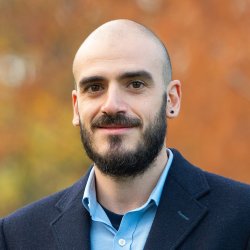Surrey to develop tool to help predict the efficiency of wind farms
A team from the University of Surrey has been awarded £150,000 from the Engineering and Physical Sciences Research Council to develop an innovative tool that predicts the efficiency of wind turbines and farms in both stable and unstable atmospheric conditions.

In 2017 just over 29 per cent of electricity generated in the UK came from renewable sources, with 21 per cent of that coming from offshore windfarms. The UK government has stated that it wants to deliver 30GW of offshore wind electricity by 2030, which is hoped will generate £48bn in UK infrastructure investments.
By gathering data from multiple turbines in different wind conditions – from those typical of daytime to those characterising night-time (i.e. with atmospheres at different temperatures) – the team from Surrey will test whether an industry-wide assumption of how turbines behave and age (the Sandia method) stands up to scrutiny. The team will also explore how the presence of surrounding wind turbines, together with wind characteristics, affects the performance and longevity of a turbine.
This project will improve the design of turbines and lead to better prediction of wind farm performance.
Dr Marco Placidi, Lecturer in Experimental Fluid Mechanics at the University of Surrey, said: “To achieve the ambitious and necessary targets that the UK has for wind energy and combatting climate change, we need to make sure we make the right decisions when we invest in renewable energy infrastructure. By interrogating the Sandia method, we hope to provide engineers and decision makers with more robust and reliable tools for designing new turbines and wind farms.”
Dr Philip Hancock, Reader in Fluid Mechanics, who has been conducting pioneering research in wind energy for the last 15 years at the University Surrey, adds “The varied states of atmospheric wind, and how these interact with the turbines (and one turbine with another), need to be modelled in the laboratory in order to develop these tools. This in itself is not easy, and has led to our internationally pioneering research in the development of new modelling techniques. The overall aim in our research is to contribute to optimising wind-farm energy yield against the inevitable turbine-life degradation, and optimising hour-by-hour wind-farm operation, thereby reducing the cost of energy.”
Featured Academics
Media Contacts
External Communications and PR team
Phone: +44 (0)1483 684380 / 688914 / 684378
Email: mediarelations@surrey.ac.uk
Out of hours: +44 (0)7773 479911

